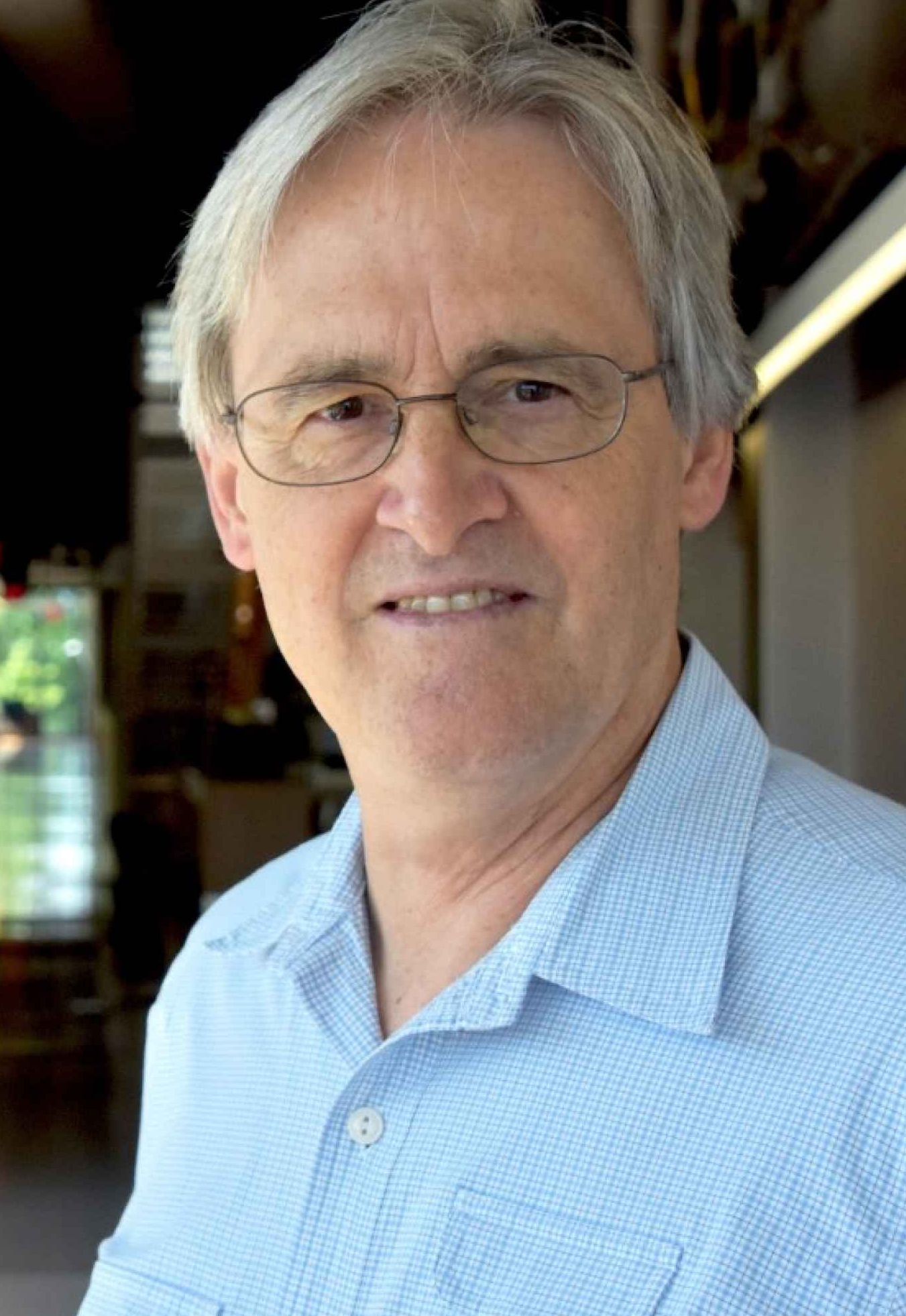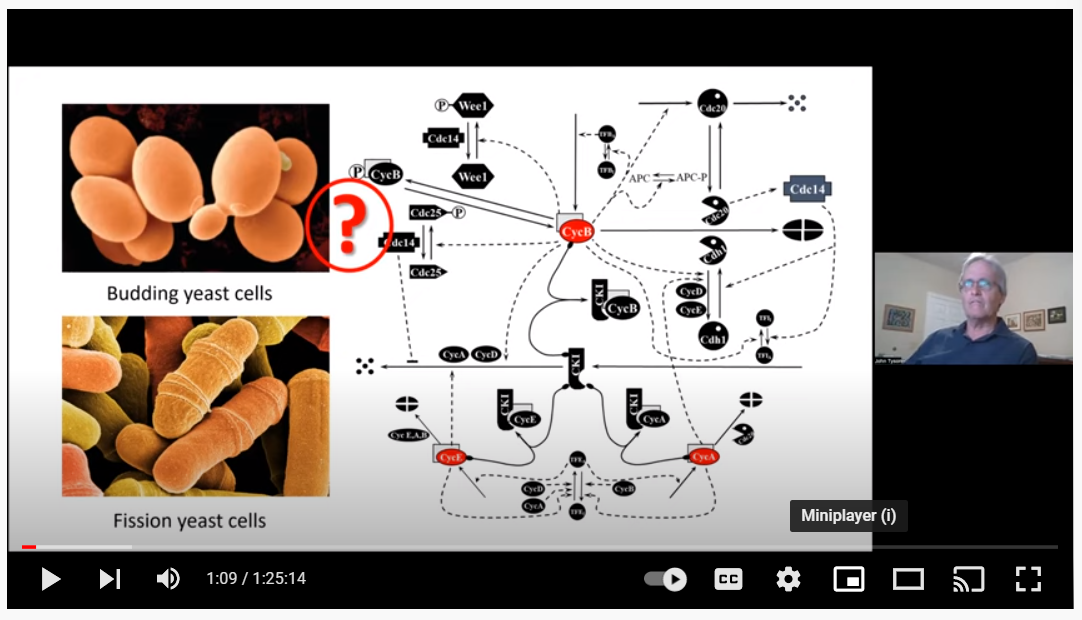John Tyson
John Tyson

Biological sciences’ John Tyson honored with emeritus status by Board of Visitors (28 Sep 2020)
Major Fields of Interest
Systems Biology, Computational Cell Biology, Cell Cycle Regulation, Signal Transduction Networks
Research
Cell cycle regulation in budding yeast; estrogen responsiveness in breast cancer cells; innate immune responses; stochastic modeling of protein regulatory networks; cell division control in alpha-proteobacteria
- Visiting Research Fellow, Merton College, Oxford University (November, 2018)
- Visiting Research Fellow, Merton College, Oxford University (January - June, 2017)
- Visiting Fellow, Isaac Newton Institute for Mathematical Sciences, Cambridge UK (May - June, 2016)
- Visiting Researcher, Merton College, Oxford University (2007 - 2016, ~4 weeks per year).
- Visiting Fellow, Isaac Newton Institute for Mathematical Sciences, Cambridge UK (Sep, 2005)
- Faculty Fellow, Virginia Bioinformatics Institute, 9/04 - present.
- Visiting Senior Scholar, Institute for Advanced Study ("Collegium Budapest"), Hungary (2003).
- University Distinguished Professor, Virginia Polytechnic Inst. and State Univ. (4/96 - present).
- Visiting Professor of Mathematics, University of Utah (9/85-12/85 and 1/96-3/96)
- Professor of Biology, Virginia Polytechnic Institute and State University (9/85-4/96).
- Senior Visiting Research Fellow, Centre for Mathematical Biology, Mathematical Institute, Oxford University, England (4/84-7/84 and 1/86-3/86).
- Associate Professor of Biology, Virginia Polytechnic Institute and State University (9/82-5/85).
- Assistant Professor of Biology, Virginia Polytechnic Institute and State University (1/78-5/82).
- Innsbruck, Austria (3/76-11/77). Advisor: W. Sachsenmaier. (Experimental studies of the control of nuclear division in Physarum polycephalum.)
- Postdoctoral Research Fellow, Institute for Biochemistry and Experimental Cancer Research, University of Innsbruck, Austria (3/76 - 11/77). Advisor: W. Sachsenmaier (Experimental studies of the control of nuclear division in Physarum polycephalum.)
- Assistant Professor of Mathematics, State University of New York at Buffalo (9/74-12/75, resigned in favor of NIH fellowship).
- Postdoctoral Research Fellow, Max-Planck-Institute for Biophysical Chemistry, Gšttingen, West Germany (6/73-8/74). Advisor: M. Eigen. (Theory of the evolution of biological macromolecules)
- Ph.D., Chemical Physics, University of Chicago, Chicago, IL. Thesis: Studies in Chemical Kinetics and Reactive Scattering. Thesis Advisor: Dr. John C. Light (1973)
- B.S. (with highest honor), Chemistry, Wheaton College, Wheaton, IL (1969)
- Fellow, Society for Mathematical Biology (2017)
- Winfree Prize, Society for Mathematical Biology (2011)
- Winfree Memorial Lecturer, Department of Mathematics, University of Arizona (2010).
- Associate Member, Royal Academy of Sciences, Belgium (2009).
- Ziwet Lecturer, Department of Mathematics, University of Michigan (2009).
- Aisenstadt Chair, Centre de Recherches Mathematiques, Univ. Montreal (2007).
- Virginia Outstanding Scientist (one of three awards for 2004).
- Doctor honoris causa, Technical University of Budapest (2000).
- Alumni Award for Research Excellence, VPI&SU (1992).
- The Bellman Prize, Mathematical Biosciences (1989).
- Public Health Service National Research Service Award (4/76-11/77).
- North Atlantic Treaty Organization Postgraduate Research Fellowship (7/73-6/74).
- National Science Foundation Graduate Fellowship (9/69-8/72).
- National Collegiate Athletic Association Graduate Scholarship (1969).
- Chemistry & Engineering News Merit Award Program (Honorable Mention, 1969).
Lectures and Selected Publications
Biomedical Mathematics Colloquium: Timekeeping and Decision-making in the Cell Cycle
By John J. Tyson
Fall 2022
Seminar Video: Information Processing in Living Organisms: What Does Bifurcation Theory Teach Us?
By John J. Tyson
June 27, 2019, Rules-of-Life Summit, Mathematical Biosciences Institute, Ohio State University
A Systems Biology View of the Cell Cycle Control Mechanisms (Review in Handbook of Systems Biology (edit. by A. J. Marian Walhout, Marc Vidal and Job Dekker), @Elsevier, San Diego, CA, 2012.)
- Irreversible transitions, bistability and checkpoint controls in the eukaryotic cell cycle: a systems-level understanding. (PDF)
Cell Cycle Vignettes (Five excerpts from an article in the Encyclopedia of Systems Biology (Edit by W. Dubitszky, O. Wolkenhauer, K.-H. Cho, and H. Yokota), @Springer Verlag, Heidelberg, DE, 2011.)
Functional Motifs in Cellular Networks (A review published in Annu. Rev Phys. Chem. 61:219-240 (2010))
- Functional motifs in biochemical reaction networks (PDF)
- A model of yeast cell cycle regulation based on multisite phosphorylation. Mol. Syst. Biol. 6:405 (2010) (PDF)
- Exploring the roles of noise in eukaryotic cell cycle. Proc. Natl. Acad. Sci. 106:6471-6476 (2009) (PDF)
- Stochastic simulation of enzyme-catalyzed reactions with disparate time scales. Biophys. J. 95: 3563-3574 (2008) (PDF)
Cell Fate Decision in Breast Cancer Cells (Review appears in Nature Rev Cancer)
- Dynamic modelling of oestrogen signalling and cell fate in breast cancer cells. Nature Rev. Cancer 11:523-532 (2011) (PDF)
Cell Fate Determination in T Cell Differentiation (Use bifurcation analysis to study T cell differentiation.)




